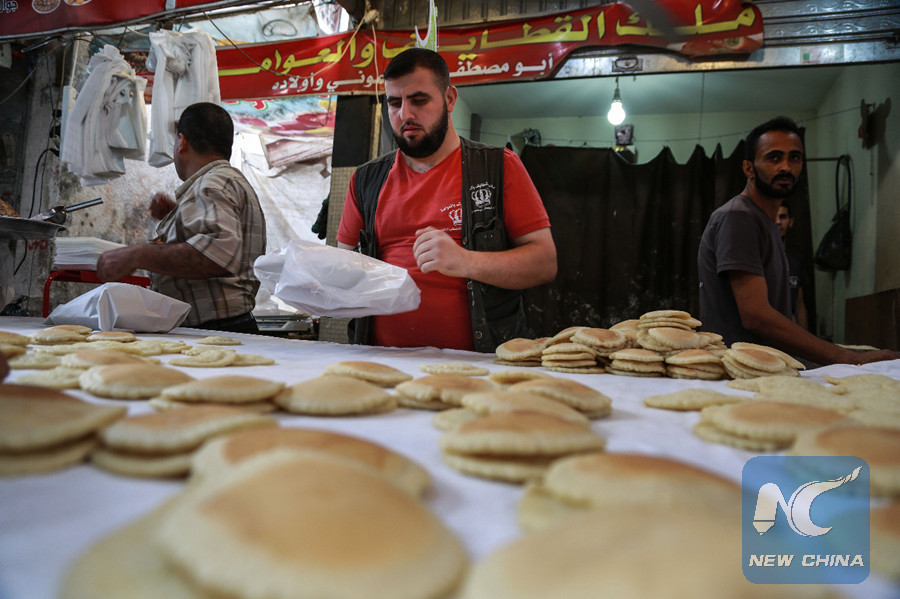
Palestinian unemployed engineer Ahmed al-Ja'ouny, 28, works inside his family shop to sell qatayef, an Arab dessert commonly served during Ramadan, in Gaza City, on May 23, 2018. (Xinhua/Stringer)
GAZA, May 24 (Xinhua) -- For unemployed engineer Ahmed al-Ja'ouny from the Palestinian Gaza Strip, the holy fasting month of Ramadan is not only a happy Islamic festivity, but also a temporary job provider.
During the holy month, al-Ja'ouny sells qatayef, an Arab Ramadan dessert, in a small shop owned by his family in Gaza city's old town.
"I hope the whole year is Ramadan," said al-Ja'ouny, a father of four, as he baked pieces of qatayef.
For Muslims, Ramadan is a celebratory religious occasion during which they abstain from eating, drinking and sexual relations from dawn to dusk.
During the main iftar meal, the evening meal after Muslims end their daily Ramadan fast at sunset, Palestinians serve different kinds of dishes, while desserts, including qatayef, are always served after the meal.
Caring for food during Ramadan led the 28-year-old electric engineer al-Ja'ouny to focus on food-related work, mainly desserts.
"I learned how to make qatayef and I used my family's old store as a selling place," he said. "Qatayef is one of the main features of Ramadan for all Palestinians."
Qatayef is made of a mixture of flour, water, powdered milk and other materials. They are baked by being poured on the drum-like surface of traditional round ovens before being sold to be cooked at home and soaked in sugary syrup.
"I sell one kilogram for almost 1.5 U.S. dollars ... this is not too much, but still better than nothing," al-Ja'ouny told Xinhua.
The young man has been jobless since he graduated five years ago.
Unlike thousands of needy Palestinians, al-Ja'ouny does not receive any aid from the government, the United Nations or other local and international nongovernmental organizations, which makes his life tougher.
"I have been looking for any job since my graduation ... I know the situation in Gaza is very difficult, but I'm hopeful that I may find a good permanent job," al-Ja'ouny said.
Gaza has been placed under a tight Israeli blockade since Islamic Hamas movement seized the territory by force after routing forces loyal to President Mahmoud Abbas in 2007.
The blockade has pushed the 2 million population in Gaza deeper into poverty as extreme poverty hit 53 percent in 2017 compared with 37 percent in 2011.
According to the Palestinian Central Bureau of Statistics, unemployment in the Gaza Strip reached 43.9 percent compared with 17.9 percent in the West Bank.
Gaza Chamber of Commerce and Industry warned in a recent report that the Palestinian coastal enclave is unable to create new jobs in the light of the high poverty and unemployment rates among the 2 million population.
The report said the private sector in Gaza is unable to provide any new job opportunities, while the public sector has the same difficulty due to the continued internal political division and the failure to achieve national reconciliation.
Moreover, the 30-percent salary cuts for government employees, which have lasted more than a year, make things worse.
Despite the deteriorating economic and living conditions in Gaza, the situation improves somehow during Ramadan since the rising demand for many commodities has helped create temporary jobs for young people.
Along with qatayef, the carob juice, a traditional Palestinian juice made of dried carob pods, water and sugar, is one of such popular commodities.
Although it is easy to make at home, Palestinians prefer to buy the carob juice from soft drink shops and vendors that can be effortlessly found during Ramadan.
Jamal al-Sousi, 18, seizes the chance of Ramadan to sell carob juice on Gaza city's streets.

Palestinian unemployed Jamal al-Sousi,18, works inside his family shop to sell carob juice, a traditional Palestinian juice that is usually drunk during Ramadan, in Gaza City, on May 23, 2018. (Xinhua/Stringer)
"I sell the drink together with my two brothers as it is highly demanded by Gazans during Ramadan," al-Sousi said, while adding pieces of ice to the juice.
He explained that his sisters and mother help make the juice at home.
"We sell well. We almost sell all the juice every day. This helps us secure income during Ramadan," he said.

